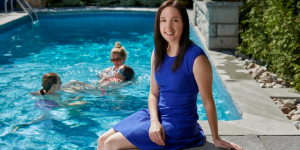 Each week, Financial Post contributor Mary Teresa Bitti revisits CBC’s previous week’s episode of Dragons’ Den. She captures what the cameras didn’t and in the process provides a case study for readers, zeroing in on what pitchers and dragons were thinking and what the challenges for the deal are going forward.
The pitch Diana Goodwin was a kid who hated the water and often found herself at the edge of the pool shivering during group swim lessons. That changed after her parents found an instructor who provided lessons in her home pool. “I went from hating the water to loving it. I just needed the right swim instructor and the right environment,” she said.
Goodwin’s experience inspired her to become a swim instructor and at age 19 she started Swim for Life Aquatics, to offer private swimming lessons. While earning an MBA from the Kellogg School of Management at Northwestern University in Chicago, she rebranded the company to AquaMobile and created a business plan that went into effect in 2012.
Each week, Financial Post contributor Mary Teresa Bitti revisits CBC’s previous week’s episode of Dragons’ Den. She captures what the cameras didn’t and in the process provides a case study for readers, zeroing in on what pitchers and dragons were thinking and what the challenges for the deal are going forward.
The pitch Diana Goodwin was a kid who hated the water and often found herself at the edge of the pool shivering during group swim lessons. That changed after her parents found an instructor who provided lessons in her home pool. “I went from hating the water to loving it. I just needed the right swim instructor and the right environment,” she said.
Goodwin’s experience inspired her to become a swim instructor and at age 19 she started Swim for Life Aquatics, to offer private swimming lessons. While earning an MBA from the Kellogg School of Management at Northwestern University in Chicago, she rebranded the company to AquaMobile and created a business plan that went into effect in 2012.
 When Goodwin pitched the dragons, Toronto-based AquaMobile, now North America’s largest at-home, on-demand swim instruction company, had 700 certified swim instructors in Ontario and 20 U.S. states. Revenue comes from the fee clients pay, which ranges from $65 to $80 a session depending on the number of lessons purchased.
“Our first U.S. markets were in South Florida in 2013,” Goodwin said. “I used that opportunity to test different marketing techniques, recruiting and advertising strategies to see what would work best and to get our technology platform to a point where we were satisfied that we could scale with it.”
That strategy was replicated in several U.S. markets starting in 2014. Those areas of early focus now represent key differentiators and the reason Goodwin opted not to franchise. “We know exactly what we’re looking for in all the swim instructors. We reach people through digital marketing channels. You don’t need an office in every city to do well at that stuff,” she explained.
Instructors are recruited through a multi-step application process that includes a video interview where candidates are asked swim-related questions to gain an understanding of their teaching style, and ensure they have the necessary skills as well as the energy and personality needed.
Another key competitive advantage is AquaMobile’s scheduling platform: “When someone calls in or looks online we can instantly tell them who’s available and when, and they can pay for it all right there. Competitors can take at least five business days to find someone because they mass email instructors in an area and then it’s first come first serve.”
Sales have more than doubled each year since 2014, when they hit $500,000. In 2015, revenue was in the seven figures (Goodwin declined to reveal the actual amount) with gross margins of 25 per cent. Everything is in place to enter more verticals, such as yoga and fitness instruction. But Goodwin’s focus for 2016 is to continue growth in the swim market by increasing depth in existing regions and moving into new markets.
The deal Goodwin asked the dragons for $200,000 in exchange for a 10 per cent equity stake. The money was to be used to accelerate growth and expand the marketing and recruiting teams. Joe Mimran and Michele Romanow partnered on an offer that included a 15 per cent equity stake and Jim Treliving offered Goodwin what she asked, which she accepted on air.
When Goodwin pitched the dragons, Toronto-based AquaMobile, now North America’s largest at-home, on-demand swim instruction company, had 700 certified swim instructors in Ontario and 20 U.S. states. Revenue comes from the fee clients pay, which ranges from $65 to $80 a session depending on the number of lessons purchased.
“Our first U.S. markets were in South Florida in 2013,” Goodwin said. “I used that opportunity to test different marketing techniques, recruiting and advertising strategies to see what would work best and to get our technology platform to a point where we were satisfied that we could scale with it.”
That strategy was replicated in several U.S. markets starting in 2014. Those areas of early focus now represent key differentiators and the reason Goodwin opted not to franchise. “We know exactly what we’re looking for in all the swim instructors. We reach people through digital marketing channels. You don’t need an office in every city to do well at that stuff,” she explained.
Instructors are recruited through a multi-step application process that includes a video interview where candidates are asked swim-related questions to gain an understanding of their teaching style, and ensure they have the necessary skills as well as the energy and personality needed.
Another key competitive advantage is AquaMobile’s scheduling platform: “When someone calls in or looks online we can instantly tell them who’s available and when, and they can pay for it all right there. Competitors can take at least five business days to find someone because they mass email instructors in an area and then it’s first come first serve.”
Sales have more than doubled each year since 2014, when they hit $500,000. In 2015, revenue was in the seven figures (Goodwin declined to reveal the actual amount) with gross margins of 25 per cent. Everything is in place to enter more verticals, such as yoga and fitness instruction. But Goodwin’s focus for 2016 is to continue growth in the swim market by increasing depth in existing regions and moving into new markets.
The deal Goodwin asked the dragons for $200,000 in exchange for a 10 per cent equity stake. The money was to be used to accelerate growth and expand the marketing and recruiting teams. Joe Mimran and Michele Romanow partnered on an offer that included a 15 per cent equity stake and Jim Treliving offered Goodwin what she asked, which she accepted on air.
"(The win) changed the game. Now, I have this free money so I don't need to give up any equity."
Due diligence was put on hold to accommodate AquaMobile’s busy season. Then, Goodwin won the Telus/Globe and Mail Small Business Challenge that came with $100,000. “That changed the game. Now, I have this free money so I don’t need to give up any equity,” she said. AquaMobile now has more than 800 instructors and is in the process of hiring for 2016, as it expands into British Columbia and several more states.
The dragon’s point of view “The door is still wide open,” Treliving said. “She is very bright, has a great business model and limited overhead expenses.” One challenge he sees is in the company’s ability to recruit high-quality instructors that are as positive as she is. Treliving’s team also made her aware of the need to have good liability insurance. “The U.S. is far more litigious than Canada,” he said. “It’s not a big concern, she just has to be cautious.” An expert’s opinion John Cho, partner at KPMG Enterprise, agrees with Goodwin’s decision not to franchise. “If she can scale without franchising, it gives her more control over the areas that matter, such as talent management,” he said. He also liked her plan to expand into other verticals. “She has a model and user interface that can be applied to many instruction areas. The key going forward is the quality of instructors and mitigating risk, especially as the business gets larger, which increases the chances of an incident happening that could damage her reputation and business,” Cho said. His one piece of advice is for her to “focus on strengthening infrastructure before pushing significant growth.”Originally posted May 10th, 2016 on Financial Post.

